|
|
|
Sort Order |
|
|
|
Items / Page
|
|
|
|
|
|
|
| Srl | Item |
| 1 |
ID:
149992


|
|
|
|
|
| Summary/Abstract |
This article adds to the growing insight into public acceptance by presenting a novel approach to how citizens make sense of new energy infrastructure. We claim that to understand public acceptance, we need to go beyond the current thinking of citizens framed as passive respondents to proposed projects, and instead view infrastructure projects as enacted by citizens in their local settings. We propose a combination of sensemaking theory and actor–network theory that allows insight into how citizens enact entities from experiences and surroundings in order to create meaning and form a reaction to new infrastructure projects. Empirically, we analyze how four citizens make sense of an electricity cable project through a conversation process with a representative from the infrastructure developer. Interestingly, the formal participation process and the materiality of the cable play minor roles in citizens' sensemaking process. We conclude that insight into the way citizens are making sense of energy infrastructure processes can improve and help to overcome shortcomings in the current thinking about public acceptance and public participation.
|
|
|
|
|
|
|
|
|
|
|
|
|
|
|
|
| 2 |
ID:
162943
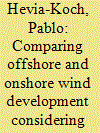

|
|
|
|
|
| Summary/Abstract |
Cost efficient deployment of wind energy is in focus for reaching ambitious targets for renewable energy and transforming the energy supply to one based on renewables. However, as more wind is being deployed the available sites onshore become less attractive in terms of wind conditions and capacity factor and more resistance from population groups affected in the deployment areas results in a reduction of areas that can be developed. We consider three different methods for estimating acceptance costs, one based on compensation and property purchase costs, one based on property value loss near wind turbines, and one based on willingness to pay calculated from a stated preference study. Utilising these methods, we provide an estimation of Levelised Cost of Energy (LCOE) for an expansion of 12 GW onshore or offshore wind capacity in Denmark. We find that the three methods provide similar estimates for local acceptance, but that a high range of uncertainty exists in the upper bound of acceptance costs. Onshore does not have a clear-cut cost advantage over offshore when considering substantial amounts of wind capacity expansion and using high estimates for nation-wide acceptance costs. Moderate onshore wind expansion considering only local acceptance has a cost advantage.
|
|
|
|
|
|
|
|
|
|
|
|
|
|
|
|
| 3 |
ID:
169850


|
|
|
|
|
| Summary/Abstract |
Nuclear energy represents an essential component of the energy mix in the United Kingdom (UK). While most of the existing nuclear plants are scheduled to be decommissioned, new reactors are in the process of being built. Looking ahead, IV generation nuclear energy technology, that aims to minimize some of the hazards of current technologies, is under research and development (R&D). This paper investigates social acceptance of IV generation nuclear energy, examining both willingness to accept (WTA) new nuclear power plants and willingness to pay (WTP) for further research of IV generation technology. Choice experiments (CE) were employed to assess WTA, while contingent valuation (CV) was used to unveil WTP. Results revealed the presence of four segments of respondents: moderate supporters, strong opposers, and two groups of moderate opposers of new nuclear power plants. Interestingly, even amongst strong opposers there are individuals willing to pay for R&D of IV generation technology. Policies aimed at fostering trust – if deserved – towards nuclear energy corporations and authorities, as well as showing tangible progress of R&D to raise confidence among the public are key to foster acceptance of this nuclear energy technology.
|
|
|
|
|
|
|
|
|
|
|
|
|
|
|
|
| 4 |
ID:
176878
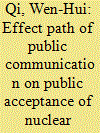

|
|
|
|
|
| Summary/Abstract |
Nuclear power plants in operation usually take public communication measures to increase the public acceptance of nuclear energy. This study explores how public communication affects public acceptance. The data were obtained through questionnaire surveys (N = 364) of residents living around the Qinshan, Tianwan, and Hongyanhe nuclear power plants in China. Based on the researches of mass communication effect path, a structural equation model showed that public communication cannot affect public acceptance directly, but can indirectly affect public acceptance through three paths. In the first path, public communication positively affects trust, trust positively affects perceived benefit, and perceived benefit positively affects public acceptance. In the second path, public communication positively affects trust, trust negatively affects perceived risk, and perceived risk negatively affects public acceptance. In the third path, public communication positively affects perceived benefit, and perceived benefit positively affects public acceptance. Furthermore, public communication has a positive effect on knowledge, but has no effect on public risk. This study also showed that knowledge cannot affect perceived risk and perceived benefit. We proposed policy suggestions based on the results.
|
|
|
|
|
|
|
|
|
|
|
|
|
|
|
|
| 5 |
ID:
101375


|
|
|
|
|
| Publication |
2011.
|
| Summary/Abstract |
Tidal energy has the technical potential to form part of a low carbon electricity sector, however, its 'social potential' is less clear, as few empirical studies of public beliefs and responses have been conducted to date. This research addressed this gap by investigating a tidal energy convertor in Northern Ireland, said to be the first grid-connected device of its kind in the world. Data was collected from 313 residents of two nearby villages using mixed methods, guided by a conceptual framework that avoided 'NIMBY' assumptions and instead drew on place theory. Findings indicated strong support for the project, arising from beliefs that the project enhanced local distinctiveness by 'putting the area on the map worldwide'; appeared visually familiar and helped tackle climate change. These positive beliefs outweighed concerns about outcome and process aspects, which were preponderant in one of the two villages. The project was interpreted to have few positive local economic outcomes, to potentially threaten local livelihoods and local ecology. Moreover, residents expressed cynicism about consultation procedures, and reported low levels of behavioural engagement. Implications of the findings for the literature on public acceptance of renewable energy, and for the emerging marine energy sector specifically, are discussed.
|
|
|
|
|
|
|
|
|
|
|
|
|
|
|
|
| 6 |
ID:
171429
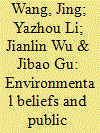

|
|
|
|
|
| Summary/Abstract |
Nuclear energy facility development in China has become controversial amid widespread environmental concerns. The present study examines how environmental beliefs influence public acceptance of nuclear energy in the context of China. In the current study, we test the mediation effect of nuclear engagement and test place attachment as a moderator based on cognitive-affective processing system theory. Our data have been obtained from an online survey, using a sample consisting of 516 individuals with experience in the public participation activities in Chinese nuclear power plant projects. The empirical results show that environmental beliefs are positively and significantly correlated to public acceptance of nuclear energy through the individuals’ nuclear engagement. Place attachment negatively and significantly moderates the direct impact of environmental beliefs on nuclear engagement. In the meantime, the mediating effect of nuclear engagement is weaker when place attachment is high. Significant practical implications are provided in our study for the Chinese governmental authorities.
|
|
|
|
|
|
|
|
|
|
|
|
|
|
|
|
| 7 |
ID:
166962


|
|
|
|
|
| Summary/Abstract |
Public acceptance (PA) is nowadays essential for the sustainable development of nuclear energy and becomes an important issue for research community. Although some studies had investigated the factors influencing PA of nuclear energy, few researches were founded to verify the impact of cultural values. This research proposed a theoretical model to explore how individualism and collectivism, as an important dimension of culture, moderated the relevance between perceived risk/benefit and PA. A questionnaire survey was conducted nationwide in China whose number of under-construction nuclear power plants ranks first in the world, and received 887 valid responses. The analysis of moderating effect showed individualism weakened the relevance between perceived benefit and PA, whereas collectivism had no significant moderating role on the relevance between perceived benefit and PA. Collectivism strengthened the relevance between perceived risk and PA, whereas individualism had no significant moderating role on the relevance between perceived risk and PA. Moreover, perceived benefit was confirmed to be a more important predictor for PA than perceived risk. The above-mentioned findings could not only provide new insights that help to understand the difference in energy policies between China and the developed countries, but also provide new reference and guidance for the future policymaking.
|
|
|
|
|
|
|
|
|
|
|
|
|
|
|
|
| 8 |
ID:
105764


|
|
|
|
|
| Publication |
2011.
|
| Summary/Abstract |
As the "low carbon, green growth" agenda, which emphasized sustainable development through equilibrium between economic growth and environmental preservation, is propagated rapidly in Korea. Despite this progress, it is not uncommon for new products made through advanced technologies, such as hydrogen fuel cell vehicles, to face public skepticism preventing market penetration. Therefore, the factors impacting customer acceptance of hydrogen fuel cell vehicles have to be estimated. Furthermore, it is necessary to examine whether or not the policies related to these products can prevent public skepticism regarding them.
This empirical study examining the relationship between personal experiences related to the policy and acceptance of the innovative products of hydrogen fuel cell vehicles shows that government involvement in technology targeting and promotions administered by the "low carbon, green growth" agenda rarely stimulate potential customers' purchase intentions. Thus, technology targeting administered by the "low carbon, green growth" agenda needs to be reconciled with customer responses to the future market.
|
|
|
|
|
|
|
|
|
|
|
|
|
|
|
|
| 9 |
ID:
128010


|
|
|
|
|
| Publication |
2014.
|
| Summary/Abstract |
Across the globe, public acceptance of nuclear power is a crucial factor for governmental establishment of a nuclear energy program. Therefore, it is important to understand the determinants of public acceptance of nuclear power. This study examines the effects of knowledge, trust, risk, and benefit related factors on public acceptance of nuclear power across 19 countries. We consider three levels of public acceptance - strongly accept, reluctantly accept, and oppose - and classify countries into four groups according to the ratio of those three levels of public acceptance. Our results indicate that knowledge of nuclear inspection is more effective than trust in inspection authorities in creating stronger public acceptance among people in the countries with a high level of reluctant acceptance and a low level of strong acceptance, while trust in inspection authorities is more important than knowledge of nuclear inspection for the selection between opposition and reluctant acceptance in countries with a low level of reluctant acceptance and a high level of strong acceptance. Without grouping the countries, we found that trust in inspection authorities is crucial for the decision between opposition and reluctant acceptance. Additionally, the generation of electricity has the most positive effect on public acceptance of nuclear power.
|
|
|
|
|
|
|
|
|
|
|
|
|
|
|
|
| 10 |
ID:
127999


|
|
|
|
|
| Publication |
2014.
|
| Summary/Abstract |
Around the world there is increasing interest from government and industry in the potential for Carbon Capture and Storage (CCS) technologies to play a part in decarbonisation. This paper examines how people with little previous exposure to CCS technology, frame and discuss it, and how in the absence of information, ideas, notions, values and experiences shape opinion. We present data from a series of focus groups held with environmental activists, planning councillors, and adult and youth community group members in London in 2012. We found that views on CCS are shaped strongly by wider factors, particularly trade offs between different energy futures. Lay-critiques were similar to those put forward by environmental groups and were strongly framed by conceptions of nuclear power. We argue that although there is little public disquiet concerning this technology in private opinions were generally negative. This, and the use of nuclear power as a framing device, may present a challenge to policy-makers and industry committed to implementing CCS while promoting education as the main mechanism for public acceptance.
|
|
|
|
|
|
|
|
|
|
|
|
|
|
|
|
| 11 |
ID:
174975
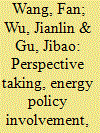

|
|
|
|
|
| Summary/Abstract |
Understanding the determinants of public acceptance is important for nuclear energy development. In the present study, we aim to explore the effects of perspective taking and energy policy involvement on public acceptance of nuclear energy. Following the motivated information processing theory, the current research proposes that perspective taking influences energy policy involvement, which in turn affects trust in government, risk perception, benefit perception, and ultimately influences public acceptance of nuclear energy. Based on an online questionnaire survey (valid samples were 933) conducted in China, results showed that perspective taking was positively and significantly related to energy policy involvement. Energy policy involvement was positively and significantly related to trust in government and benefit perception, while negatively and significantly related to risk perception. Trust in government and benefit perception were positively, while risk perception negatively and significantly related to public acceptance of nuclear energy. Theoretical and policy implications were discussed on the basis of these findings.
|
|
|
|
|
|
|
|
|
|
|
|
|
|
|
|
| 12 |
ID:
127162
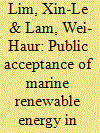

|
|
|
|
|
| Publication |
2014.
|
| Summary/Abstract |
Research and development (R&D) on marine renewable energy (MRE) in Malaysia is still in its initial stage. It is crucial to know the level of acceptance of MRE among Malaysians in order to push the technology forward. A survey was conducted to investigate public acceptance of MRE in SS2, Petaling Jaya. In addition, a face-to-face interview was conducted to understand the concerns of an investor about investing in renewable energy (RE) projects. The results of analysis showed that 82.8% of the respondents support MRE implementation in Malaysia. However, 56.8% of the respondents are reluctant to pay for green electricity. The reason is directly linked to the NIMBYist (NIMBY= Not in My Backyard) attitudes of Malaysian citizens. They are unwilling to support green energy by involving themselves, participating or paying money. Furthermore, the interviewee, on behalf of investors, expressed some opinions on concerns about investment in RE projects. Several ministries and departments are suggested as being important in MRE development.
|
|
|
|
|
|
|
|
|
|
|
|
|
|
|
|
| 13 |
ID:
121035


|
|
|
|
|
| Publication |
2013.
|
| Summary/Abstract |
In the wake of ominous results about the impending path of climate change, and with gasoline prices hovering around four dollars per gallon, the 2012 presidential and congressional campaigns are full of claims and counterclaims about the transformation of the U.S. energy system. Although much discussion has centered on the need for new energy technologies, this debate as yet has been narrow and limited. Meaningful deployment of any technology will raise questions of public acceptance. Little is known about how diverse publics in the United States will respond to the advent of new energy sources, whether they involve a "second renaissance" for nuclear power, a dash to embrace hydraulic fracking for oil and natural gas, or emerging prospects for renewable energies like wind and solar power. Yet public acceptance will determine the outlook. Adding further complication is the growing debate about traditional energy sources and the extent to which a fossil fuel - based energy system should continue to be central to the American economy. This essay explores the issues involved in public acceptance of stability and change in the U.S. energy system. We conclude with several recommendations for gaining a greater understanding of the public acceptance quandary.
|
|
|
|
|
|
|
|
|
|
|
|
|
|
|
|
| 14 |
ID:
163541
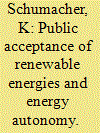

|
|
|
|
|
| Summary/Abstract |
In the context of climate change mitigation and increasing decentralized generation of energy from renewable sources, public acceptance of renewable energy (RE) has become an important issue in energy research. Many studies have addressed public acceptance through a case-based empirical lens with rather specific conclusions for individual technologies in a given context. This paper draws more universal insights by conducting an online survey on public acceptance for a set of technologies in the three sub-regions of the Upper Rhine region (URR). Using a representative dataset of 495 German, 501 French, and 493 Swiss inhabitants of the URR, several hypotheses from the acceptance literature are tested across sub-regions and RE technologies and results are compared to related empirical studies from the literature. Moreover, we explore for the first time how public acceptance is linked with community energy and energy autonomy. The latter is especially important to understand how policy and project initiators can mobilise the population to contribute to the energy transition. Our main findings are that public acceptance is, inter alia, highly dependent on the technology in question, the dimension of social acceptance (community versus socio-political dimension) and previous experiences with RE technologies.
|
|
|
|
|
|
|
|
|
|
|
|
|
|
|
|
| 15 |
ID:
163542
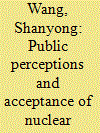

|
|
|
|
|
| Summary/Abstract |
Nuclear energy has been regarded as a controversial energy option to reduce carbon emissions, alleviate global warming and transition to a low-carbon society. Understanding public perceptions and acceptance of nuclear energy and identifying the determinants of acceptance are vital to make nuclear energy policy and establish nuclear energy program. Based on a questionnaire survey conducted in China (N = 719), this study aims to examine public perceptions and acceptance of nuclear energy, and explore the effects of public knowledge about nuclear energy, perceived benefit, perceived risk and public engagement on public acceptance. This study indicated that public knowledge is positively and significantly related to perceived benefit and public acceptance, but not significantly related to perceived risk. Perceived benefit and perceived risk are all positively and significantly associated with public acceptance. Meanwhile, this study also demonstrated the positive effect of public engagement on public acceptance. In addition, this study also revealed that public knowledge, perceived benefit and public engagement in China are at a lower level, and public acceptance of nuclear energy is at a moderate level. However, the level of perceived risk is higher. Based on the results, implications and suggestions are presented.
|
|
|
|
|
|
|
|
|
|
|
|
|
|
|
|
| 16 |
ID:
132759
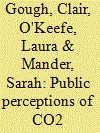

|
|
|
|
|
| Publication |
2014.
|
| Summary/Abstract |
This paper explores the response by members of the lay public to the prospect of an onshore CO2 pipeline through their locality as part of a proposed CCS development and presents results from deliberative Focus Groups held along a proposed pipeline route. Although there is a reasonable level of general knowledge about CO2 across the lay public, understanding of its specific properties is more limited. The main concerns expressed around pipelines focused on five areas: (i) safe operation of the pipeline; (ii) the risks to people, livestock and vegetation arising from the leakage of CO2 from the pipeline; (iii) the innovative and 'first of its kind× nature of the pipeline and the consequent lack of operational CO2 pipelines in the UK to demonstrate the technology; (iv) impacts on coastal erosion at the landfall site; and (v) the potential disruption to local communities during pipeline construction. Participants expressed scepticism over the motivations of CO2 pipeline developers. Trust that the developer will minimise risk during the route selection and subsequent construction, operation and maintenance of the pipeline is key; building trust within the local community requires early engagement processes, tailored to deliver a variety of engagement and information approaches.
|
|
|
|
|
|
|
|
|
|
|
|
|
|
|
|
| 17 |
ID:
176758
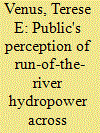

|
|
|
|
|
| Summary/Abstract |
A large share of future European hydropower projects will be run-of-the-river schemes. To understand the potential for RoR hydropower development and modernization of the technology as an opportunity for sustainable decentralization, we use the Q-methodology to compare public values about RoR hydropower in German, Portuguese and Swedish case studies. Four perspectives on the importance of RoR hydropower emerged from our analysis: (i) maintain regional control, (ii) fight climate change, (iii) promote citizen well-being and (iv) protect natural ecosystems. Strong preferences for regional control imply RoR should be managed as distributed generation rather than viewed as part of a centralized, national system like traditional large-scale reservoir hydropower. Based on the importance of citizen well-being and ecological measures, operators could adopt strategies such as river widening and the reconstruction of secondary channels, which help control floods, create recreational opportunities as well as enhance ecological habilitation and biodiversity. Additionally, policymakers could support rigorous monitoring programs to assess the ecological impact of RoR.
|
|
|
|
|
|
|
|
|
|
|
|
|
|
|
|
| 18 |
ID:
175902
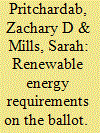

|
|
|
|
|
| Summary/Abstract |
National polling data consistently find a large, bipartisan group of Americans support state renewable portfolio standards (RPS), policies which mandate generation of electricity from renewable sources. However, when such policies are actually put before voters on the ballot, they have been met with mixed success: out of seven RPS ballot initiatives, only four have been approved. From a newly compiled dataset of county-level voting results, we use ordinary least-squares regression to investigate the determinants of public support for RPS ballot proposals. Two models are constructed based on literature related to legislative adoption of RPS and, separately, public support of pro-renewable policies. Consistent with previous studies, political, economic, and demographic variables are found to be significant in predicting voter behavior. State-level fixed effects, however, are the largest contributors to both models. A synthesis model, combining elements from both the legislative adoption and public acceptance literatures, performs best when fixed effects are removed. As climate advocates increasingly call for policies to more quickly transition the electricity sector to renewable energy sources, this research provides greater insight into the prospects of successfully achieving that aim through a ballot initiative. It also, however, reveals insights applicable to legislature-driven RPS policies.
|
|
|
|
|
|
|
|
|
|
|
|
|
|
|
|
| 19 |
ID:
150468
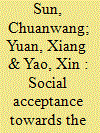

|
|
|
|
|
| Summary/Abstract |
Air pollution is one of the most predominant challenges in China. In order to ensure the smog governance projects could be promoted smoothly and the public shoulder the environmental responsibilities consciously, it is necessary for the policymakers to take public attitude into consideration, and understand the public willingness to pay (WTP) for smog mitigation. This paper adopts a CV method framework to assess the value of WTP and analyze the determinants. Given the consideration of the possible presence of the selectivity bias caused by protest responses, the bivariate sample selection model is constructed for estimation. Results show that up to 14% of respondents hold the protest responses, and neglecting the selection bias caused by protest responses would lead to downward biased estimates. The mean value of WTP for the smog mitigation is 1590.36 RMB per year, accounting for about 1% of annual income. Moreover, the NIMBY (not in my backyard) attitude among public is found to be significantly correlated with their WTP, and the other determinants such as household annual income, energy expenditure and economic loss caused by smog could also substantially affect the value of WTP. We further recommend grading governance and policy transparency to address the smog crisis.
|
|
|
|
|
|
|
|
|
|
|
|
|
|
|
|
| 20 |
ID:
103594
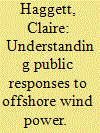

|
|
|
|
|
| Publication |
2011.
|
| Summary/Abstract |
This paper is about understanding the role and importance of public responses to offshore wind power. It builds on a framework for understanding social acceptance and opposition to onshore turbines, and reviews the emerging research on offshore wind. While less is known about how people will respond to offshore than onshore wind, there is now an emerging body of research. From this literature, several common factors which influence responses have emerged and are discussed here: the (continued) role of visual impact; place attachment to the local area; lack of tangible benefits; relationships with developers and outsiders; and the role of the planning and decision-making systems. The paper argues that, as with onshore developments, the public should be included in decision-making about offshore wind farms, and that they have a key role which should not be underestimated. The paper concludes with some thoughts about the means to involve people and how effected communities might be effectively acknowledged, identified and engaged.
|
|
|
|
|
|
|
|
|
|
|
|
|
|
|
|
|
|
|
|
|